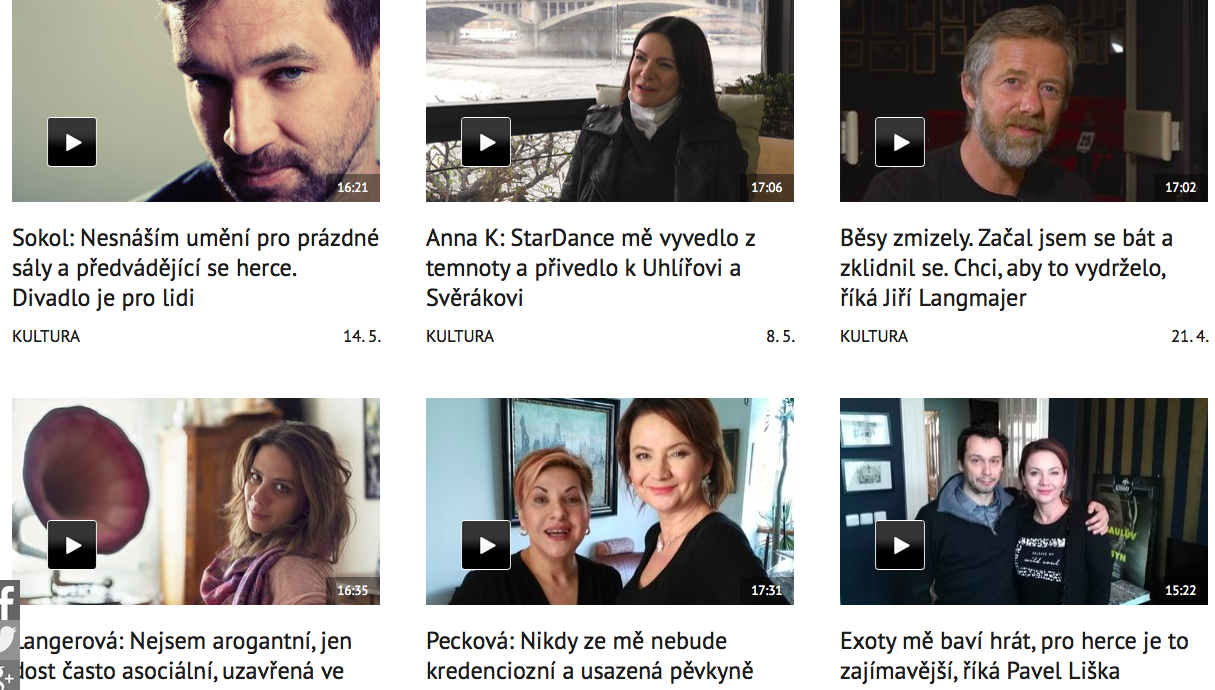
DVTV, a popular independent online news site, is one of two Prague-based sites reinventing news in Czech Republic: its content is entirely video-based.
News organisations in the Czech Republic have made significant investments in video content in the past three years. While most include video as part of their news package, two Prague-based online news platforms have made video central to their business model.
DVTV, a popular web-based TV platform, and Seznam Zprávy, a daily news site, use video almost exclusively. Using the format to tell stories, report investigations and broadcast interviews online.
The popularity of these two sites, as well as growing evidence that video attracts audiences and advertisers, is leading others to follow their example.
DVTV – video interviews and debates
Czech audiences like interviews. They like to read interviews with well-known personalities, and also to watch them, online or on television. DVTV (Drtinová-Veselovský TV), the first Czech news site entirely based on video content, has capitalised on this.
The platform broadcasts studio-based interviews with politicians, artists, and public figures. They also produce news stories, combined with interviews, on location.
Live streaming is an important part of DVTV programming. DVTV uses various streaming platforms, such as Facebook and YouTube, as well as its own website, to stream programmes such as DVTV Forum, an hour long, live-streamed interview or debate with a broad range of guests from different fields. The audience submits the questions asked in the Forum, via social networks.
DVTV was launched in 2014 by journalists, Daniela Drtinová and Martin Vesolovský, and their editorial team. Drtinová and Vesolovský had resigned from their jobs at Czech TV, the public broadcaster, following a 2013 presidential election coverage controversy: Drtinová was one of 23 Czech TV journalists who had complained to the government’s broadcasting watchdog about threats to Czech TV’s independence during the elections.
In 2015, a year after its launch, DVTV started a successful crowd-funding campaign which earned over two millions Czech crown (approximately 80,000 euro). The money was used to develop and extend the content, and to hire new staff.
According to Jan Rozkosny, DVTV’s editor, the investment paid off. He reported that, according to metrics from Google Analytics, the site reached 5.5 million unique users in January 2017. The average time spent on one video page is 11.5 minutes, Rozkosny said.
Seznam Zprávy – mobile journalists producing video news
In November 2016, leading Czech search engine Seznam.cz launched the news site, Seznam Zprávy (Seznam News). The site is also video-based, although it uses a ‘hybrid format’ with articles also appearing on the site in text form.
Seznam hired Jakub Unger, an experienced journalist, to run Seznam Zprávy. Unger was one of the original founders of Aktualne.cz, the Czech Republic’s first digital-native independent news project. Before that, every Czech news site had been supported by one of the larger news publisher or broadcasters.
Jakub Unger drafted other respected journalists, such as political commentator Jindřich Šídlo from daily Hospodářské noviny, foreign correspondent Martin Jonáš, financial journalist Zuzana Hodková from Czech TV, plus investigative journalists Jiří Kubík and Sabina Slonková. With these experienced reporters, Seznam Zprávy now produces a wide range of online video programmes – from short newscasts broadcast from a studio, to longer – 20 minute – investigative features.
Seznam Zprávy broadcasts regular, scheduled news programmes. For example, every evening at 6pm a news video summing up the major events of the day is posted. The site also posts several news stories each day.
Seznam Zprávy innovates in other ways, including using mobile journalism to make its video content. Using only a smartphone or tablet, the site’s journalists not only write and narrate the videos, they are also cameraperson, editor and producer. The devices are used for filming, live streaming, sometimes even for editing.
A recent examples of mobile journalism on Seznam Zprávy is a journey by reporter Pavel Cyprich. He travelled to Poland with a US army convoy in March this year. His report of the journey was produced, filmed and edited on his mobile device. Seznam Zprávy published his video news reports and Cyprich was also a remote participant – via his mobile – in a live interview with the presenter in the Prague studio.

A video news report made entirely on the reporter’s mobile device as he travelled through Poland with a US army convoy.
Additionally, Seznam Zprávy produces investigative programmes such as Special Investigation in which political or business scandals are uncovered and reported.
According to a Czech metrics site, Netmonitor Online, which monitors traffic to news sites, Seznam Zprávy had 3,530,953 unique views in January 2017.
Better mobile networks
The growth of video in news has been enabled by improving Czech mobile networks, which now provide sufficient download speed for video content.
Another contributing factor is the increase in media advertising spend in the Czech Republic overall (up 8% overall in 2015). Online ad spend has become a significant proportion (20%) of the total media market – the same level as print, which is on a downward trend, according to the Reuters Institute Digital News Report, 2016.
Other EJO stories you might like: Media Predictions Survey 2017, Facts, Quality, Revenue and Video
and
Online Video News Driven by Technology, Publishers and Platforms, not Consumers
Images: screen shots, DVTV and Seznam
Tags: Czech Republic, digital news report, DVTV, Journalism, media, Media advertising, Media research, Mobile journalism, news reporting, RISJ, Seznam Zpravy, video















































